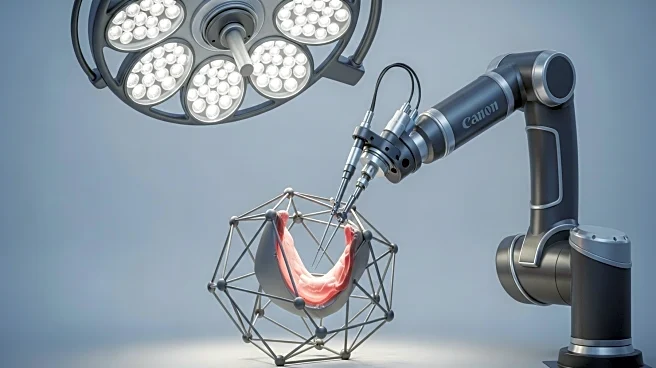What's Happening?
Medtronic plc has announced successful results from the Enable Hernia Repair clinical study, which evaluated the Hugo robotic-assisted surgery (RAS) system for inguinal and ventral hernia repair procedures. This study, presented at the American Hernia Society annual meeting, marks the first-ever Investigational Device Exemption (IDE) clinical study for robotic-assisted hernia surgery in the United States. The study involved 193 patients and met primary safety and effectiveness endpoints, with a surgical success rate of 100%, surpassing the pre-specified performance goal of 85%. The study also demonstrated a significantly lower surgical site event rate compared to the predetermined performance goal. These results highlight the potential of the Hugo RAS system to enhance surgical outcomes and patient care in hernia repair procedures.
Why It's Important?
The successful completion of the Enable Hernia Repair study is significant for the U.S. healthcare industry as it introduces advanced robotic-assisted surgical options for hernia repair, a common procedure performed on nearly 1.5 million patients annually. The Hugo RAS system offers minimally invasive solutions, potentially reducing recovery times and improving patient outcomes. This advancement aligns with Medtronic's mission to expand access to innovative surgical technologies, providing surgeons with more choices and patients with greater access to necessary care. The study's results may influence hospital systems and healthcare providers to adopt robotic-assisted surgery, potentially transforming surgical practices and improving healthcare delivery.
What's Next?
Medtronic plans to expand the indications for the Hugo RAS system, with a U.S. urology indication currently under review by the Food and Drug Administration. Following this, the company aims to introduce indications for hernia repair and gynecology. The Hugo RAS system is already clinically used in over 30 countries, and its availability in the U.S. could further drive adoption of robotic-assisted surgery. As Medtronic continues to innovate, the healthcare industry may see increased integration of robotic systems, leading to advancements in surgical techniques and patient care.
Beyond the Headlines
The introduction of the Hugo RAS system in hernia repair could have broader implications for surgical practices, potentially setting new standards for minimally invasive procedures. The system's success may encourage further research and development in robotic-assisted technologies, fostering innovation in the medical field. Additionally, the adoption of such systems could influence healthcare policy and investment in surgical technology, emphasizing the importance of technological advancements in improving patient outcomes and healthcare efficiency.









